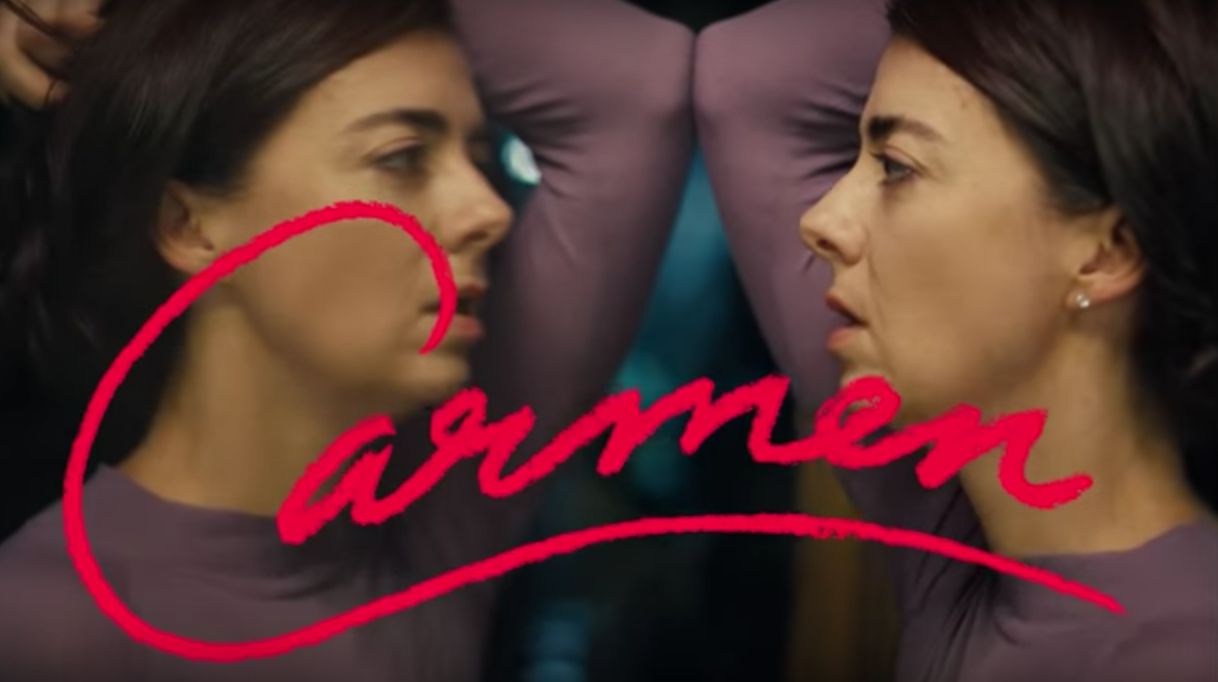Chloë Sevigny is no stranger to fashion or film–in fact, she’s a hardened veteran by now. After completing her first short film, Kitty (not to be confused with Kedi), last year, a sort of opposite of Kafkaesque story of a little girl who turns into a cat, Sevigny has now teamed up with Miu Miu’s filmic outlet, Women’s Tales. An ongoing project that began in 2012 in participation with the Venice Film Festival, Sevigny joins the ranks of such other celebrated female directors as Zoe Cassavetes and Agnès Varda for the thirteenth installment in the series, titled simply Carmen, in honor of its eponymous star, Carmen Lynch.
Exploring that unique lifestyle that is the existence of a stand-up comedian on the road, Sevigny taps into both the bittersweet loneliness and the professional (therefore personal) triumphs of making complete strangers laugh via the relatably depressing anecdotes of her life. With a sugar plum fairy/The Nutcracker sort of backing track, there is both a fancifulness and a sinisterness to the way Carmen’s day-to-day routine is depicted. In her first stand-up segment, she opens with: “I stopped online dating. I’m done. Now I just walk outside and hope.” The honesty of her defeat is what makes Carmen so captivating as she gazes at herself in the mirror, presumably analyzing–via the amount of visible wrinkles she has on her face–how much time she has left to be seen as trollable.
But just because Carmen may seem hopelessly single doesn’t mean she’s in any rush to get wifey’d up as she takes aim at the inevitable boredom of coupledom by remarking in her next act: “That’s adorable when married people go on date night. It means they’re having problems. They’re like, ‘Let’s go back to the time when we still liked each other. When I didn’t know your addictions, and you didn’t know my family. Let’s reenact that tonight. From eight to twelve.’ Do you know how you know dating is more fun than being married? People who date don’t have married night.”
The depth with which Sevigny goes to get to the core of this character’s macabre nature shines through with Lynch’s confirmation that many of the scenes were largely true to life, but of course heightened for cinematic flair. Lynch, speaking to a specific moment in the short, admits of the comic’s life, “Sometimes at the bar, I am sitting by myself… there is an element to standup where you’re so used to being alone… Being alone doesn’t even feel like you’re alone anymore. You just get used to it ’cause you have to ’cause you’re traveling alone so much.”
And so sitting alone in public places–especially bars–comes across as organic when watching Carmen perch herself on a barstool and enjoy a drink, her standup routine fusing into a hybrid form of voiceover while she muses, “I’m obsessed with death. I think about it all the time. If you’re my friend, I’ve probably pictured you dead.” It is in this scene that Sevigny most noticeably takes advantage of her cinematographer, Eric Edwards, by drenching the space with blurred, bright color in a manner that feels like a lovechild to the style of Nicolas Winding Refn and Sofia Coppola–the way Carmen is a lovechild of Aubrey Plaza and Chelsea Peretti. The repetition of certain imagery–Carmen visiting the same convenience store where the same men harass her or Carmen staring at the same picture of an old pinup at the same bar while waiting for the next show to come–heighten the sense of how much ennui is involved in the presumed dynamism of being “on the road.”
The appropriate adage on the marquee as Carmen leaves the bar one night, ALL THAT GLITTERS IS NOT GOLD, drives home the point that, yes, it all looks glossy and glamorous from the perspective of seeing Carmen on the stage, but it’s those behind the scenes moments, those off hours that prove the great love of her life is her craft–that’s the thing she’s willing to endure so much overall drudgery and solitude for. By the end, the contrast of her standup self with the self that roams the streets of Portland aimlessly is visually delineated by one scene superimposed over the other to denote the stark divide. But just a hint of a smile as she meanders along the bridge in the endless killing of time until the next gig lets us know that she’s perfectly happy being sad–as long as she can talk about it later onstage.
And yes, everyone, right down to the extras, is swathed in Miu Miu-sponsored costuming, which only makes everything even easier on the eyes. Mainly, the takeaway is, look out Sofia Coppola. Sevigny’s not likely to leave the camera now.





















